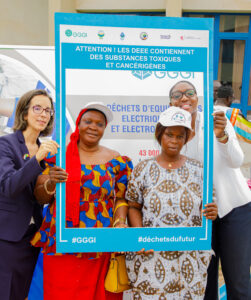The E-waste Day 2022 was celebrated in Dakar as part of the project on the management of waste water, plastic waste and waste electrical and electronic equipment in Senegal’s green secondary cities through innovative business models for recycling and recovery, funded by the government of the Grand Duchy of Luxembourg for a period of three years.
The waste electrical and electronic equipment management component is implemented in Dakar in collaboration with the Direction de l’Environnement et des Etablissements classés – DEEC, Senegal Numérique Ex ADIE, the regional centre for the Basel Convention and Stocholm for the structuring of the sector. Electrical equipment is estimated at 43,000 tonnes in 2030 in Senegal, according to the study on technical support for the development of at least six categories of waste, which are still little known and yet constitute the means to meet our current technological needs.
These are heat exchange equipment, small electronic equipment, household and professional equipment. “In Senegal in 2030, it is estimated that there will be 43,000 tonnes of electronic equipment in circulation.
WEEE is also known for the dangerous substances it contains, depending on the category: CFCs, HCFCs and HFCs, mercury, toxic luminous powders…
Senegal has embarked on a new policy for the development and promotion of a more equitable information society based on access to ICTs. In order to achieve the objectives of sustainable development, the Ministry of the Environment, Sustainable Development and Ecological Transition is working towards a society that promotes the rights of individuals and the openness of public authorities, so that our populations can enjoy an inclusive education. It is a society that cares for the environment and takes advantage of new ways to improve energy efficiency, transport, dematerialisation and digitisation of goods and services, in order to support the transition to a low carbon economy, while better adapting to the effects of climate change. In order to address these issues, the Global Green Growth Institute (GGGI) has decided to work on the sustainable management of waste electrical and electronic equipment (WEEE) in Senegal.
The event brought together all the ecosystem: dismantling operators, private sectors , climate action associations, our implemented partners Direction of environment, the regional center for basel convention, senegal numerique and EVE and aslo the funded partners represented by the Senegal embassy cooperation in chief : Tania Martins Fidalgo.


A declaration of the actors was read and handed over to the authorities as a strong commitment to the decision makers for the structuring of the WEEE sector during the ceremonial session and a panel was hosted on the implementation of the eco-organism.